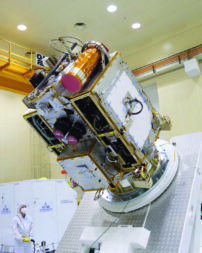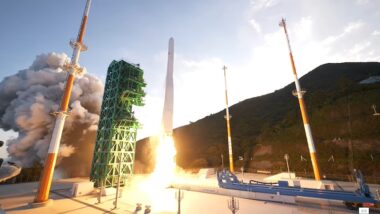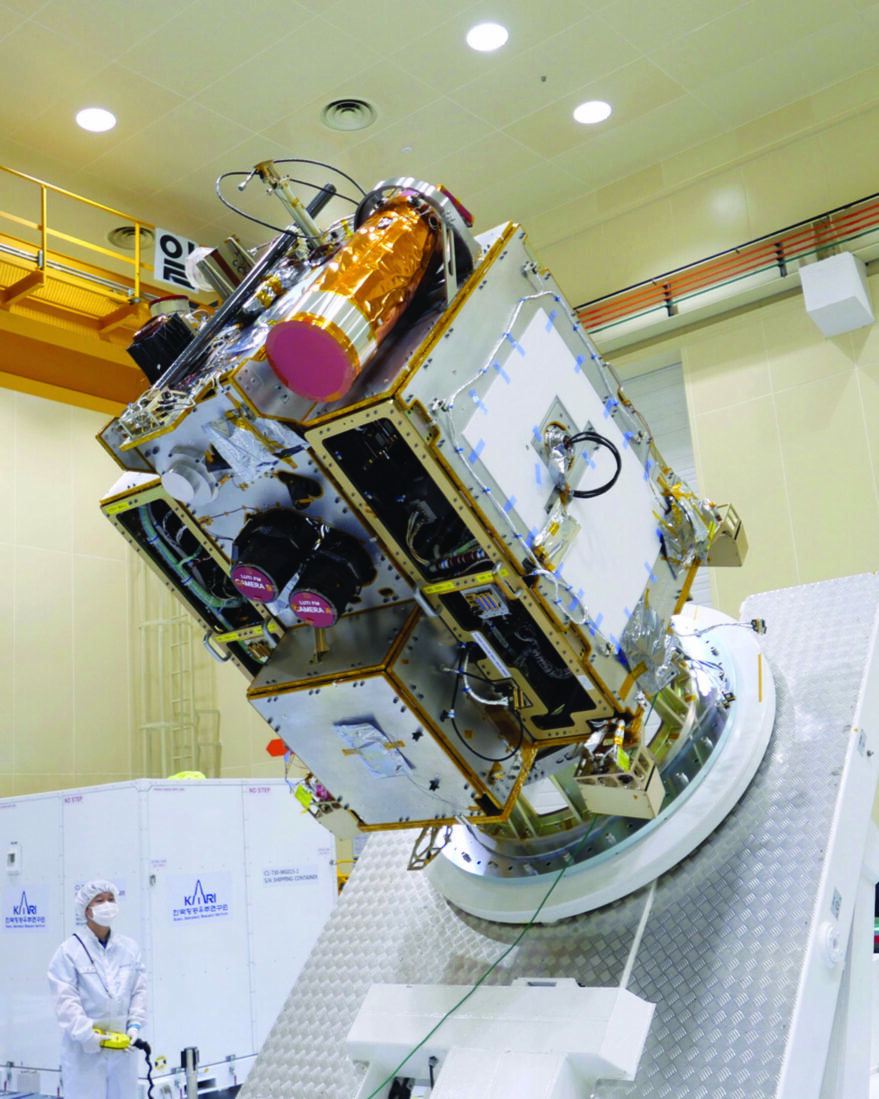
being lifted off the floor by its mounting ring,
is slated to launch in August on a SpaceX
Falcon 9 rocket. Credit: KARI
SEOUL, South Korea — South Korea is boosting its space spending this year by 19% over 2021 levels as it seeks to bounce back from October’s failed attempt to prove it can put up a satellite without Russian rocket hardware.
The $619 million that South Korea will invest in national space programs in 2022 is 15% more than the amount the government originally proposed.
The double-digit difference between the final budget and what was initially sought is rare, indicating the growth opportunity South Korea’s government sees for its domestic space industry, according to An Hyoung-joon, a research fellow at Science and Technology Policy Institute, a state-funded think tank based in Sejong.
South Korea’s Ministry of Science and Information and Communication Technology announced the nation’s 2022 space budget in late February, calling it the “first time in the nation’s space development history that projects regarding rocket, satellite and space exploration are included in a yearly to-do list at the same time.”
“It’s an important year [for South Korea] because there are a series of much-anticipated space development missions that are set to take place,” Vice Science Minister Yong Hong-taek said, citing the second launch of South Korea’s fully domestic KSLV-2 rocket plus foreign launches of two South Korean-built satellites and the nation’s first lunar orbiter.
Nearly 29 percent of the budget, $175.8 million, will be used for launch vehicle development. KSLV-2, the larger successor to the two-stage KSLV-1 rocket that relied on a Russian RD-191 engine for liftoff, is scheduled to make its second flight in June. In its October debut, the three-stage KSLV-2 reached its intended altitude but failed to put its dummy payload into orbit when its liquid-fueled upper stage shut down early.

The budget also funds work on a high-performance liquid-fueled engine for KSLV-2’s eventual successor and an effort to help develop second-stage engines for commercial smallsat launchers that would use KSLV-2’s KRE-075 first-stage engine.
South Korea’s Agency for Defense Development is working on solid-fuel rockets for future military surveillance satellite launches under an initiative sparked last year by the U.S. lifting decades-long restrictions on South Korean missile development.
The lion’s share of the 2022 space budget, or $276.4 million, is set aside for satellite projects, among them the CAS500-2 and KOMPSAT-6 Earth-observation satellites set to launch on separate Russian Soyuz rockets this year. These launches, however, are uncertain because of international sanctions imposed on Russian for invading Ukraine.
South Korea’s satellite budget also be used to fund the development of KOMPSAT-7, design the architecture of at least six remote sensing or communications satellites, and open a new satellite operations center.
Some $70 million is budgeted for work on the Korean Positioning System, a constellation of eight navigation satellites South Korea aims to deploy between 2027 and 2034. Satellite production is expected to begin in 2024 after completing work this year on core navigation technology.
South Korea’s 2022space budget sets aside $25 million for exploration, including the launch of the Korea Pathfinder Lunar Orbiter (KPLO). NASA provided a high-resolution camera nicknamed ShadowCam that will be used to search the permanently shadowed regions near the moon’s poles for water. KPLO is slated to launch in August aboard a SpaceX Falcon 9 rocket.
